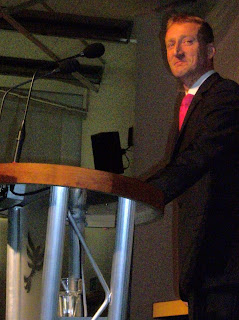Tavish Scott quits as Scottish Lib Dem leader
 The news, when it finally came, was hardly surprising.
The news, when it finally came, was hardly surprising.The leader of the Scottish Liberal Democrats, Tavish Scott, has decided to stand down following what The Herald terms a "disastrous" election for his party. "Disastrous" is perhaps understating it a little. Make no mistake - this was a massacre on a scale not witnessed in UK politics since 1997. The big questions following the catastrophic collapse were not about analysis of the actual result, but in asking how the Scottish Liberal Democrats can move forward and whether Tavish Scott is the right man to lead us into the future. Mr Scott has decided to answer the second question directly, insisting that "the party needs a new direction, new thinking and new leadership to win back the trust of the Scottish people...it's for the party now to decide how to move forward and I think that's best done with a new leader."
Scott was quick to blame the "Clegg effect" for the Liberal Democrats poor showing and while this undoubtedly had a significant effect I personally find such an explanation to glib and simplistic. Clegg's unpopularity would not have had the same potency if the Scottish leadership had succeeded is communicating their distinct policy platform and Scottish agenda to voters. Similarly, if Scott had been more convincing during the televised debates, if the media weren't so easily persuaded to write him off as an irrelevance or if the Lib Dem campaign had been better prepared for the SNP's tactical genius (in marginalising the smaller parties in the regional vote while persuading their supporters to vote for them in the constituencies) the scale of the defeat would in all likelihood have been not quite so devastating.
Tavish Scott has achieved a great deal in his political career of which he should be justifiably proud. I found him easy to like, but recognised his limitations as a leader. A fellow Lib Dem blogger confided that they were pleased Green leader Patrick Harvie was excluded from the televised debates because he would have easily out-performed Scott. I took an opposite view on Harvie's absence but I fully understood why Lib Dem supporters didn't feel inspired by Scott's oratorical or debating skills.
Nick Clegg said of Scott that "He has been an excellent and energetic leader of the Scottish Liberal Democrats at an extremely difficult time, as well as a good friend and colleague. I'm sure he would have done a brilliant job leading the fight back for the LibDems in Scotland but I fully respect his decision." I'm not too convinced about the last part, but perhaps Clegg owes Scott more than kind words given that it is the way the party is perceived in Westminster that undermined the efforts of the Lib Dems in Scotland.
Charles Kennedy was more sober-minded. Reflecting on "mission impossible", he surmised that "Tavish is one of our country's most talented politicians and his response today is characteristically honourable. It deserves to be met by a response at a UK Liberal Democrat level which is similarly honest."
The Scottish Liberal Democrats are now looking for their fourth leader in a little under six years. What the party needs is innovative and inspiring leadership which can make effective use of our role as a minor party of opposition. What we can not afford to happen is for the Liberal Democrat voice in Holyrood to become more marginalised or for us to become perceived as a Labour-lite anti-independence party.
I wish Tavish Scott the best for his future political career. I am sure he will continue to be an excellent MSP for Shetland; he is also being considered as a potential Deputy Presiding Officer in the new parliament, which would be an appropriate opportunity for him to utilise his obvious talents to better effect.
An election for the leadership is likely to be held later in the year; current frontrunners are Willie Rennie and Liam MacArthur. In the interim, Jo Swinson will be acting leader of the Scottish Liberal Democrats.
Comments